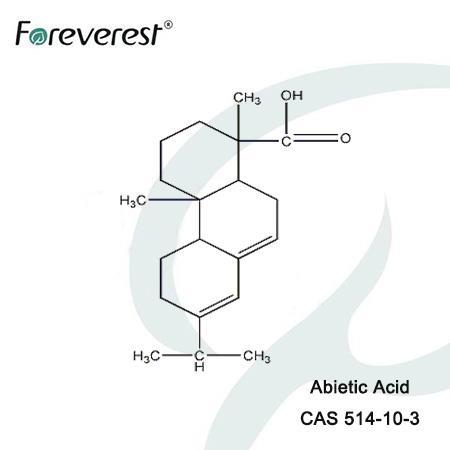Abietic Acid
Abietic acid (CAS 514-10-3) is a white, resinous powder derived from rosin. Its meticulous preparation process involves distilling rosin, steaming out residual turpentine oil, filtering the substance at approximately 210°C, followed by cooling and crystallising to obtain the final product.
Substance Identification
| Synonyms | Rosin Acid |
| CAS | 514-10-3 |
| EINECS | 208-178-3 |
| FEMA | N/A |
| HS.CODE | 2917 |
| Molecular Formula | C20H30O2 |
| Moleclar Weight | 302.45 |
Application & Uses
- Curing Agents:
- Utilised as curing agents for epoxy and petrochemical products.
- Pharmaceuticals & Cosmetics:
- Serves as a pharmaceutical intermediate, widely used in the development of antibacterial and anti-inflammatory drugs, as well as anti-carcinogens.
- Acts as a starting material in the total synthesis of various potent active agents, including:
- (-)-triptonide and (-)-triptolide, known as potent antitumour and immunosuppressant agents;
- The quinone (-)-12-deoxyroyleanone, an antileshmanial agent;
- And the abietic acid-derived catechol (methyl 11,12-dihydroxyabietate-8,11,13-trien-18-oate, MDTO) as a potential antioxidant agent;
- Also applicable in Epoxidation with m-CPBA.
- Used as a surfactant and emulsion stabiliser in cosmetics.
- Rubber & Polymer Industry:
- Following sodium hydroxide saponification, it is used as a polymerisation emulsifier for styrene-butadiene rubber and chloroprene rubber.
- Additionally, it can serve as a rubber plasticiser and adhesive.
- Adhesives & Papermaking:
- An important ingredient in high-grade paper adhesives and gums.
- Other Industrial Uses:
- Can be employed as a pesticide emulsifier.
- Used as a textile sizing agent.
- Functions as a lubricant in construction materials.
- Also serves as a paint drier.
Features & Benefits
- Controlled Chemical Reactivity & Precise Formulation Flexibility:
- Abietic acid exhibits an inherent ease of oxidation, enabling specific reactivity in certain applications, such as curing agents and paint driers.
- Concurrently, its notable differential solubility across various alcohol solvents (solubility in descending order: Butanol + Propyl Alcohol > Anhydrous Ethanol > Methanol) provides formulators with high flexibility and precise control, allowing for the selection of the most suitable solvent system based on specific application requirements.
Sales Specification
| ITEM | VALUE |
|---|---|
| Appearance | white powder |
| Melting point | 160-162℃ |
| Acid Value, mgKOH/g | 180 min |
| Purity | 99% min |
GHS Hazard Statements
| H-Code | H315/319/335/400 |
| P-Code | P261/264/271/273/280 |
| Response | P302+P352 P304+P340+P312 P305+P351+P338 P332+P313 P337+P313 P391 |
| Storage | P403+P233 P405 |
| Disposal | P501 |
Storage
- Environmental & Temperature Control:
- Store in a cool, dry, and well-ventilated area, and protect from light.
- Avoid high temperatures and extreme temperature fluctuations to ensure product stability and quality.
- Ensure the storage area is cool and well-ventilated.
- Container Management & Prevention:
- Ensure containers are tightly closed to prevent moisture ingress, contamination, and dust dispersion, and are clearly labelled.
- Avoid damage to containers to prevent product spillage.
- Hazard Isolation:
- Keep storage areas away from heat, sparks, open flames, and all sources of ignition.
- Keep away from incompatible materials to prevent hazardous reactions.
- Safe Handling & Inspection:
- Handle carefully, avoiding dust generation.
- Stack stably to prevent package damage.
- After prolonged storage, always check quality before use.
- Compliance & Emergency Preparedness:
- Strictly comply with all safety regulations, particularly those pertaining to the storage of solid powders.
- Ensure emergency plans are in place for unforeseen circumstances.
Relation Products
Relation Articles
Remark
The above information is believed to be accurate and presents the best explanation currently available to us. We assume no liability resulting from above content. The technical standards are formulated and revised by customers’ requirement and us, if there are any changes, the latest specification will be executed and confirmed in the contract.
Start Purchasing
-
Minimum Order Quantity
Quote required -
Lead Time
Quote required -
Available Incoterms
Quote required -
Regional Availability
Quote required
